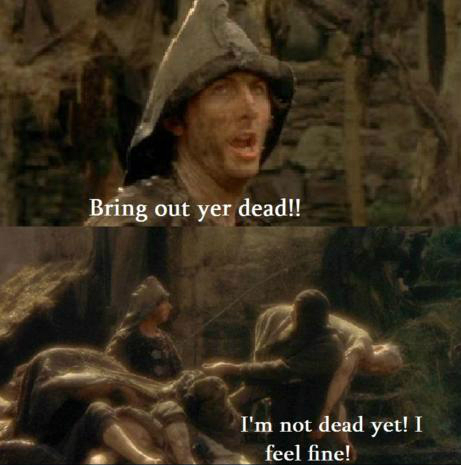I missed this from Alistair Dabbs last weekend, but it’s still just as concerning as it was then:
Zombies walk among us – until they need a nice sit-down, of course. It can be tiring to be undead. No wonder they drag their feet around and do all that moaning.
One such moaner is 58-year-old Michel from Montpellier. He has never stopped complaining since the postman delivered a letter one morning in June to offer him condolences on his recent death.
It was, as you might imagine, an administrative error: someone had probably clicked in the wrong checkbox or filed a request in the wrong folder. It was unlikely to be the result of a concerted Kafka-esque conspiracy to erase Michel from existence. Uncheck that box, drag the file out of the folder. It should be easy enough.
Evidently not. Once you’ve been declared dead, it sets in motion a sequence of automated digital-only procedures that sprint towards completion with alarming rapidity. You may have heard of France’s notoriety for officious paperwork and the snail-pace of its bureaucracy when you are living and breathing. But once you’re a stiff, it’s the fast lane electrons all the way.
Michel discovered that his bank accounts had already been frozen. His social security file had been closed immediately. His national health ID card was no longer valid and his top-up health insurance was cancelled.
He nipped over to his local social security office to see if they could put the brakes on the process but apparently it was too late: everything had already been done to kill him off, bar physically shoving him in a box and inviting friends and relatives around for beer and sandwiches.
Surely there’s a rollback option?
Ah now, it’s not that simple. The system architect that designed the automated process did not think of making [Alive] and [Dead] a pair of either-or radio buttons. They did not envisage a situation in which death, our ultimate existential destination, could be reversed by choosing Edit > Undo. There are no second- or third-life Power-Ups IRL. Instead, the system architect not unreasonably assumed that dying would be a one-way trip from which nobody is expected to return.
The system is not a complete disaster, though. The woman at the desk of the social security office was able to use it to find that a French national with exactly the same name and birthdate as Michel had died – albeit 4,500km (c 2,800 miles) away in Israel – and the two strangers’ records had probably been mixed up by a poorly trained official. So the error has been located. Good. Can it be corrected, please?
Yes, she said, before booking him in for a meeting to discuss it in two weeks’ time. No doubt he was also asked to bring documents that explicitly state when he didn’t die.






